update 28.
into the wild, tribal style
Cycling through Kenya
11 November 2008
Total kilometers cycled: 43,850
Specific country info on routes & roads/food & accommodation/the locals available here.
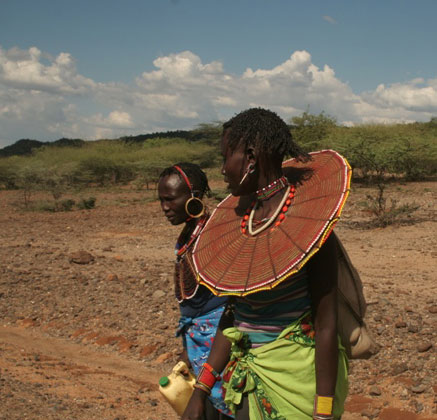 I woke up with an ominous feeling about what lay ahead. We were
in Kapedo, a small Turkana village in Northern Kenya surrounded by
hostile Pokot territory. Both the Turkana and the Pokots are
pastoralists, known to carry out raids on opposing tribes. For
decades, cattle rustling and revenge have been a way of life for these
people. The AK-47 assault riffle is now the preferred weapon of
defense. Gone are the days when young men protected their herds
with simple spears and arrows. On reaching Kapedo, I'd been
greeted by one such young man out herding, his AK-47 slung casually
over his shoulder.
I woke up with an ominous feeling about what lay ahead. We were
in Kapedo, a small Turkana village in Northern Kenya surrounded by
hostile Pokot territory. Both the Turkana and the Pokots are
pastoralists, known to carry out raids on opposing tribes. For
decades, cattle rustling and revenge have been a way of life for these
people. The AK-47 assault riffle is now the preferred weapon of
defense. Gone are the days when young men protected their herds
with simple spears and arrows. On reaching Kapedo, I'd been
greeted by one such young man out herding, his AK-47 slung casually
over his shoulder. "Come, my friend," he'd called out cheerily. "I am Turkana. I mean no harm."
I stopped dead in my tracks and glanced over my shoulder. Eric was nowhere in sight.
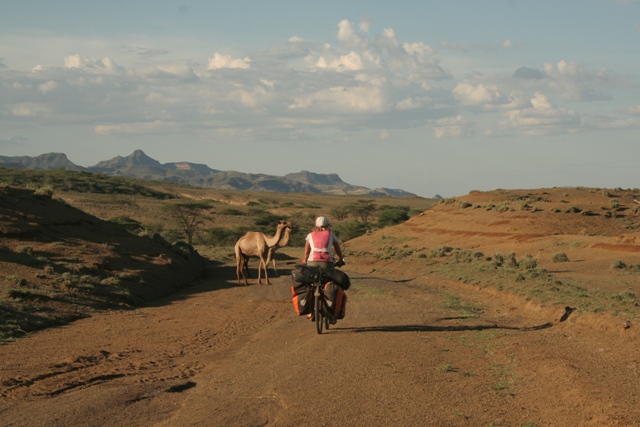 "Just waiting for my husband," I stammered, trying to conceal my fear.
"Just waiting for my husband," I stammered, trying to conceal my fear.The village was in view and it was unlikely that he would shoot me, I reasoned. Still, I didn't like being in such close proximity of a teenager toting a lethal weapon.
The boy approached, extending his hand in greeting. His casual air and friendly grin put me at ease and I decided that this desolate corner of Kenya was not to be my final resting place.
I managed a smile and small talk until the sound of Eric's wheels pushing through the sand made me turn.
He glanced at us, nodded and continued on his way.
'Well, that was my husband, guess I better go. Nice meeting you." And I followed Eric into the village below, leaving the boy dumbstruck at my rapid departure.
Later, Eric chided me for foolishly chatting with an armed stranger just as dusk was falling. I reproached him for his rudeness, thinking it better to get on the good side of all who are armed..
But we didn't have long to argue because a crowd quickly formed. Foreigners where obviously not a common sight in Kapedo. Not surprising, really. We'd not seen a single vehicle on the road since noon, when we had stopped for lunch in a Pokot village. The village wasn't particularly welcoming. We were greeted with hostile stares from the women and drunken overtures from the men. It was probably the most exotic place we'd ever visited. Everyone was adorned with beads, piercings and oversized collars. We would have liked to snap a few photos, but with the palpable hostility we thought better of it.
Since leaving the village, we'd passed a few Pokot women on foot and seen camels grazing on the roadside. Otherwise, there had been no signs of life. This part of Kenya was a very insular tribal zone. The only outsiders were the military, who appeared to stay holed up in the safety of their heavily guarded compounds and a few traders who had come from other parts of Kenya to do business.
We'd heard conflicting stories about security in the region. Some locals claimed the area was peaceful, others admitted there were security issues but insisted that white skin was a passport to safety. The Pokots were apparently only interested in acquiring more cattle. They weren't common bandits, likely to mug or harm foreign tourists.
In Kapedo, we'd found refuge at the outstation of the local Catholic mission. We'd slept in a small room behind the simple church, a picture of Jesus keeping watch as we tried to get some rest in spite of the oppressive heat and the continual buzz of mosquitoes.
I'd slept fitfully, imaging various scenarios of how I might perish in the desert on the lonely stretch of road that lay ahead. Perhaps the Pokots would ambush us, like the Indians in those old John Wayne films I'd watched as a child. Or maybe we'd die of thirst. I'd recently read Into the Wild, the story of a young man's Alaska Adventure gone wrong. Poor Chris had starved to death although he was in fact not more than a day's walk from civilization. It wasn't so far-fetched to imagine that we might die of thirst on a 110 kilometer stretch of uninhabited semi-desert.
Even before the alarm sounded at 4:45 I voiced my concerns to Eric. He scoffed at my fears and hinted that I was losing my taste for adventure. Maybe he was right. Still, I was adamant that we not go further without seeking advice at the nearby military compound. It would be better to turn back, I maintained, than risk our lives.
As the first rays of sun cast a warm orange glow over the hills, Jacob arrived. He was the soft-spoken catechist who looked after the church in the priest's absence. I'd heard mumbling outside the door as I enjoyed the last few sips of my morning coffee. I was in no hurry, having decided not to go ahead with the day's journey. Eric was obviously trying to recruit Jacob to help him bring me to my senses.
"Really, madam, there is no reason to worry. The Pokot people have fled to the hills. They are far away now. You will reach Lokori in the afternoon. The road is fine." Jacob spoke to my in the slow, comforting voice of a parent trying to reason with a difficult child.
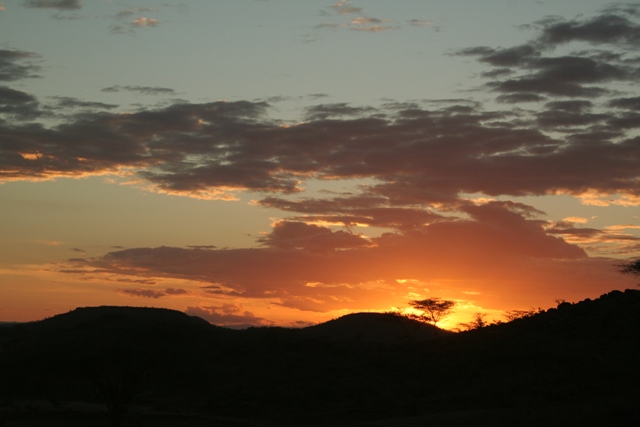 Two
against one. I let myself be persuaded and within minutes we were
on the sandy track leading out of town. After about 25 kilometers
there was a fork in the road. No one had bothered to mention
this. And there would certainly be no passers-by to point us in
the right direction. The faint track leading off to the right appeared
to be the more used of the two, so we headed off in that direction.
But we appeared to be making a loop back to Kapedo. That
couldn't be right. And were wasting precious time and energy.
I decided to turn back while Eric insisted on forging ahead.
We could both be stubborn, sometimes to our detriment.
Two
against one. I let myself be persuaded and within minutes we were
on the sandy track leading out of town. After about 25 kilometers
there was a fork in the road. No one had bothered to mention
this. And there would certainly be no passers-by to point us in
the right direction. The faint track leading off to the right appeared
to be the more used of the two, so we headed off in that direction.
But we appeared to be making a loop back to Kapedo. That
couldn't be right. And were wasting precious time and energy.
I decided to turn back while Eric insisted on forging ahead.
We could both be stubborn, sometimes to our detriment.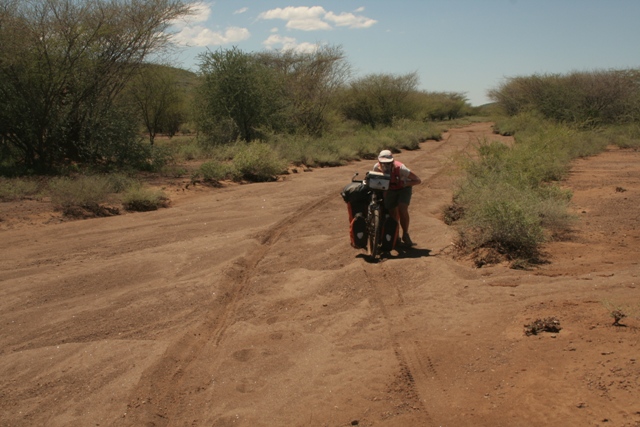 I
plopped down in the hot sand once I again reached the fork and
waited for Eric to appear. It was almost 11:00 and we'd made
little progress. Plus we were rapidly depleting our meager water
reserves. How foolish we'd been to set off with just 8 liters of
water between the two of us. We'd been told there was a working
pump 80 kilometers from Kapedo. This was the only remainder of a
Turkana village which had been burnt to the ground during a spell of
hostilities between the Pokots and the Turkanas. Without ample
water and given the uncertainty of which track to follow, it was best
to turn back I concluded.
I
plopped down in the hot sand once I again reached the fork and
waited for Eric to appear. It was almost 11:00 and we'd made
little progress. Plus we were rapidly depleting our meager water
reserves. How foolish we'd been to set off with just 8 liters of
water between the two of us. We'd been told there was a working
pump 80 kilometers from Kapedo. This was the only remainder of a
Turkana village which had been burnt to the ground during a spell of
hostilities between the Pokots and the Turkanas. Without ample
water and given the uncertainty of which track to follow, it was best
to turn back I concluded. Within a few minutes Eric turned up again, insisting that he was certain the left fork was the correct route to follow and urging me to get a move on. In the distance I saw a series of sharp peaks and a steep and rocky path. Had the heat driven him mad, I wondered? But somehow I let myself be cajoled into continuing.
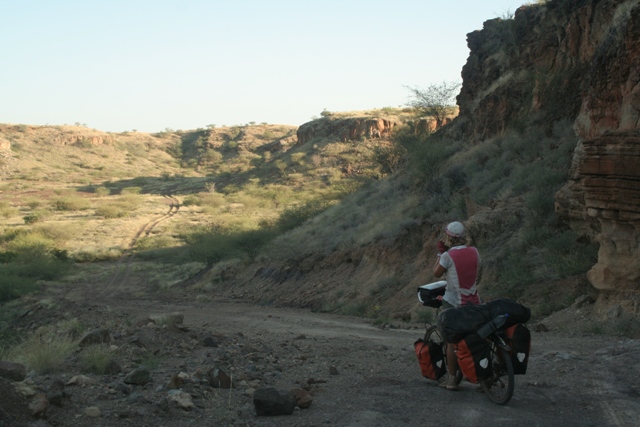 It
was impossible to ride now and we heaved and pushed, cursed and cried.
Another five kilometers on, Eric came to a sudden halt. He
had just realized that one of our precious bottles of water had bounced
off the bike. "You wait here. I'm going back to find it,"
he instructed. I was all too happy to comply with the enforced
rest. And amazingly there was even a thorntree nearby which
provided a bit of protection from the unrelenting sun. My throat
was parched and I could have easily guzzled all the remaining water.
Instead, I prudently sipped, knowing how important it was to
conserve the fluid.
It
was impossible to ride now and we heaved and pushed, cursed and cried.
Another five kilometers on, Eric came to a sudden halt. He
had just realized that one of our precious bottles of water had bounced
off the bike. "You wait here. I'm going back to find it,"
he instructed. I was all too happy to comply with the enforced
rest. And amazingly there was even a thorntree nearby which
provided a bit of protection from the unrelenting sun. My throat
was parched and I could have easily guzzled all the remaining water.
Instead, I prudently sipped, knowing how important it was to
conserve the fluid.After ten minutes of waiting I called out into the eerie silence. No response. I was suddenly gripped by fear. Maybe someone had been silently following us and had now captured Eric and whisked him away to be tortured. Maybe he'd gotten lost and was wandering around the vast expanse of the desert. Deep down I knew my fears were irrational, but that didn't help. Now I was really determined to return to the relative safety of Kapedo. With some effort, I turned my bike around in the deep sand and began pushing it in the opposite direction. A few minutes later I met a triumphant Eric, who raised the bottle high in the air as if it were a trophy.
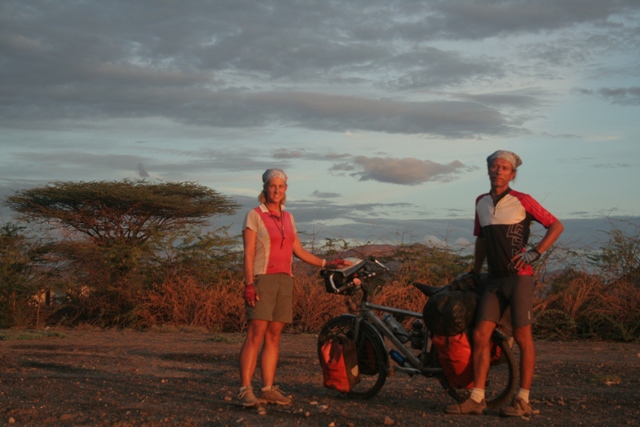 "I'm going back to Kapedo," I muttered with as much resolve as I could muster given the circumstances.
"I'm going back to Kapedo," I muttered with as much resolve as I could muster given the circumstances."But you can't. We're almost there. The most difficult part is over. Just that one more hill and we'll be down in the valley. We'll be at the pump in no time. I promise you."
How could he promise me such a thing? He had no more of an idea than I did about what lay ahead. There was only a 50% chance the we were even on the right 'road'. Maybe we were headed deep into Pokot country. These people burn villages. They're known to kill women and children. They're unpredictable and they're armed.
But a part of me didn't want to quit. Didn't want to admit defeat. I tuned the bike around again and continued to trudge slowly on.
By 4PM we'd done 55 kilometers and were down to about a quarter of a liter of water. 25 kilometers to the water pump. If we were on the right road, that is. They only positive sign was that the sky had begun to cloud over. A few days back there had been some unseasonable showers. It might rain and we could collect water, thus delaying our imminent death. We were going to die. I was sure of it now. When the next vehicle passed, they'd find my decaying corpse under an acacia. Eric was putting up a more positive front, though I caught him furrowing his brow every time he snuck a look at the compass. We obviously weren't headed in the right direction.
In a bout of hysterical selfishness, I claimed the last of the water for myself. It was only fair I reasoned, since I'd wanted to turn back on several occasions.
The hills were unrelenting and we were both sweating profusely. I wondered just how long the body could go without water under such conditions.
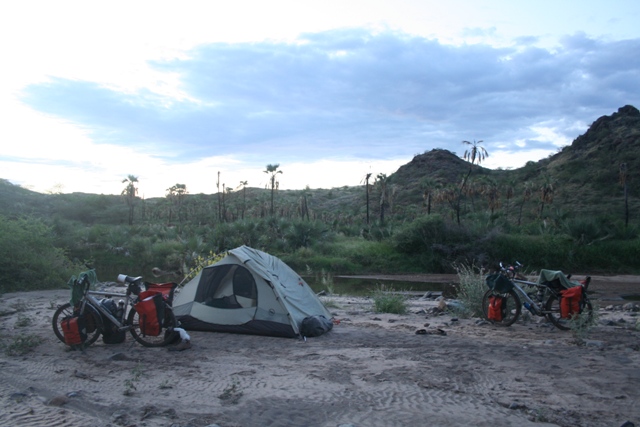 As
we crested yet another hill we could make out in the distance
something quite incongruous. There were palm trees. Palm
trees could only mean one thing in that arid land. There was
water nearby. We quickened the pace and before we knew it our own
little desert oasis appeared. The small body of water was
stagnant and had a mossy green tinge to it, but it was water.
Water. Water! Saved again. All my hysterics for
nothing.
As
we crested yet another hill we could make out in the distance
something quite incongruous. There were palm trees. Palm
trees could only mean one thing in that arid land. There was
water nearby. We quickened the pace and before we knew it our own
little desert oasis appeared. The small body of water was
stagnant and had a mossy green tinge to it, but it was water.
Water. Water! Saved again. All my hysterics for
nothing.We rejoiced at our luck, set up camp in the dry river bed and quenched our thirst until we were both waterlogged. I even washed and conditioned my hair. Things were looking up.
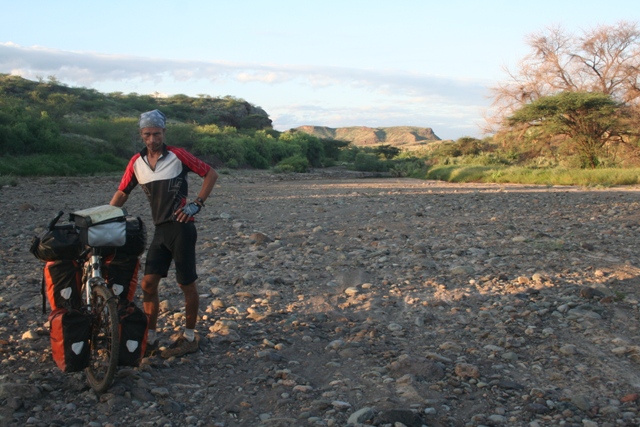 The
next morning we found the pump, just six kilometers from where
we'd camped. The locals had been wrong about their distances.
By lunchtime we rode into Lokori and immediately headed to the
mission where we were greeted by Father Jhon Mendoza from Peru.
The good father was aghast when we told him about our journey
from Kapedo. Vehicles pass that way only once or twice a month he
told us. Just a week before 35 Turkanas had been massacred at
the water pump six kilometers from where we had camped. He himself
had gotten lost on that road before. Two things were certain: we
were very foolish, and very lucky.
The
next morning we found the pump, just six kilometers from where
we'd camped. The locals had been wrong about their distances.
By lunchtime we rode into Lokori and immediately headed to the
mission where we were greeted by Father Jhon Mendoza from Peru.
The good father was aghast when we told him about our journey
from Kapedo. Vehicles pass that way only once or twice a month he
told us. Just a week before 35 Turkanas had been massacred at
the water pump six kilometers from where we had camped. He himself
had gotten lost on that road before. Two things were certain: we
were very foolish, and very lucky.*****
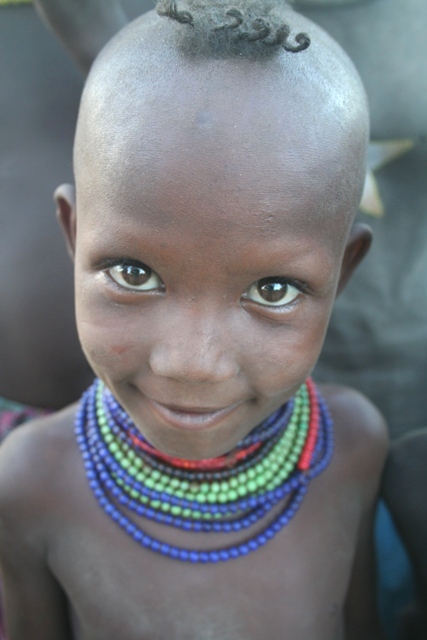
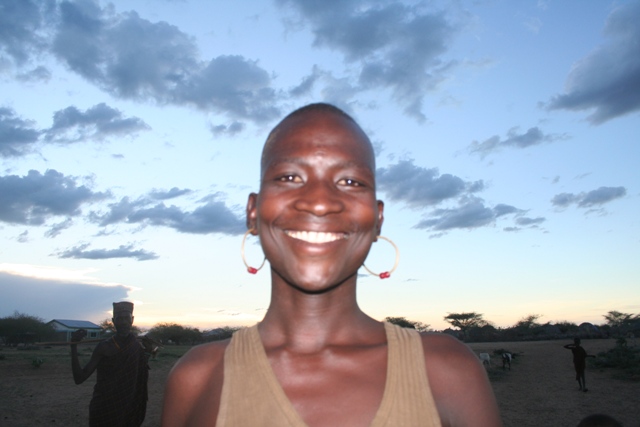
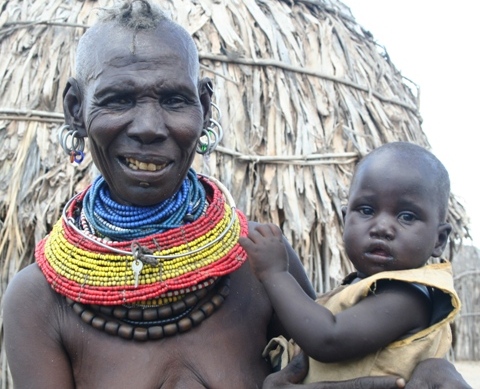
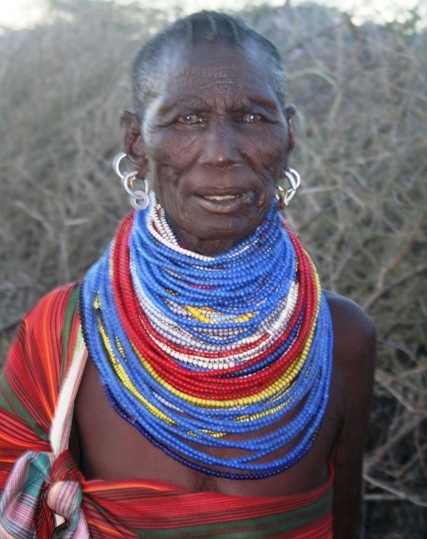 The
number of strands of beads a Turkana woman has in the collar she wears
is an indication of her wealth. Unfortunately, drought, epidemics and cattle
rustling have reduced many Turkanas to poverty. Nowadays, families often
rely on food relief from international charities such as Oxfam.
Turkana communities are fiercely supportive and families who
receive aid share with those less fortunate. If times are really
hard, a goat or cow will be bled and its nutritious blood mixed with
milk and given to the children. Bearing much similarity to the Sahel, Turkanaland is
one of the most inhospitable parts of Africa. We had decided to
cycle through this fascinating and unforgiving region, and there were
more challenges to be faced.
The
number of strands of beads a Turkana woman has in the collar she wears
is an indication of her wealth. Unfortunately, drought, epidemics and cattle
rustling have reduced many Turkanas to poverty. Nowadays, families often
rely on food relief from international charities such as Oxfam.
Turkana communities are fiercely supportive and families who
receive aid share with those less fortunate. If times are really
hard, a goat or cow will be bled and its nutritious blood mixed with
milk and given to the children. Bearing much similarity to the Sahel, Turkanaland is
one of the most inhospitable parts of Africa. We had decided to
cycle through this fascinating and unforgiving region, and there were
more challenges to be faced. Our Michelin map showed no road skirting Lake Turkana. We knew, however, that a rough track existed, having read the journal of two German cyclists who'd traveled that way in 2005. They'd spent a week covering a little more than 100 kilometers. Such a painfully slow pace seemed almost impossible to me. Why I could walk faster than that.
Quite a few Turkana fishermen live along the shores of the alkaline lake, and the helpful Catholic diocese in Lodwar had given us a map indicating water points along the way , so I wasn't too worried about the ride. Day one was tough--sand bogging us down being the biggest challenge-- but we'd still been able to knock back almost 50 kilometers. I optimistically thought we'd be at the border within two days. We set up camp outside the Catholic church in a small Turkana village and Eric went off with the pastor from the Protestant church to fetch water at the pump. After an hour he'd still not returned. It was getting dark and I asked the crowd of young men who had come to gawk at the foreigners if they had an idea what could be taking so long. My inquiry was met with shrugs. Just as the mosquitoes began biting, he pulled up on his bike lugging our two 10 liter Ortlieb bladder bags and all our assorted bottles. The pastor had filled up a jerry can for us.
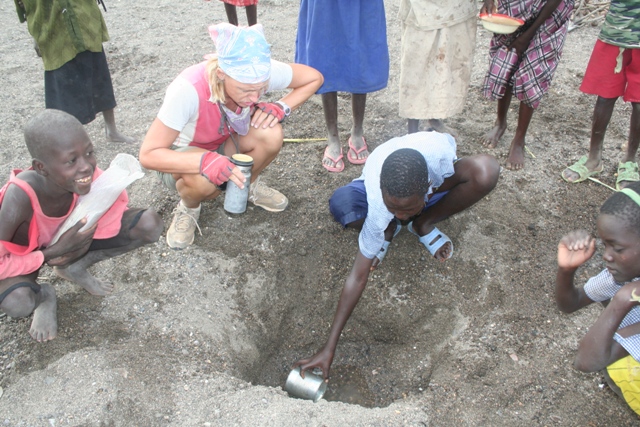 "The
pump's locked," he explained. "And the pastor's got the key but
the lock is rusted so he can't open it." Apparently, the pump
wasn't in use. The villagers instead had to go down to the dry
riverbed and dig for water. Yes, dig for water. I'd heard
about this desperate measure before, but had never thought I'd be
drinking water that had been scooped out of the sand. In fact,
the water was surprisingly clear and tasty. The trick was to
watch out for the last
"The
pump's locked," he explained. "And the pastor's got the key but
the lock is rusted so he can't open it." Apparently, the pump
wasn't in use. The villagers instead had to go down to the dry
riverbed and dig for water. Yes, dig for water. I'd heard
about this desperate measure before, but had never thought I'd be
drinking water that had been scooped out of the sand. In fact,
the water was surprisingly clear and tasty. The trick was to
watch out for the last
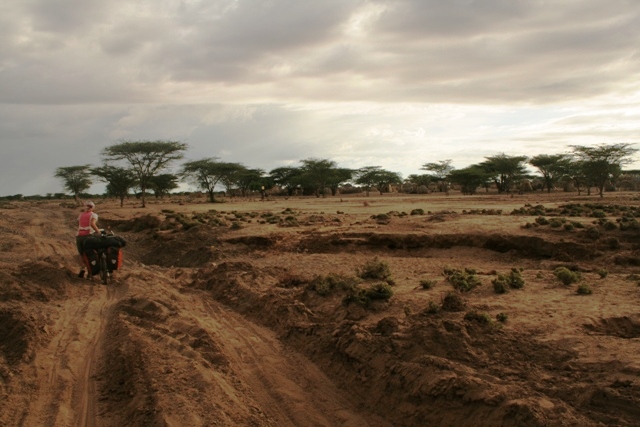 few
gulps in the bottle which tended to be a bit gritty, something like the
end of a Turkish coffee when you get a mouthful of grounds.
But we had water, and I'd learned that that in itself was
blessing enough.
few
gulps in the bottle which tended to be a bit gritty, something like the
end of a Turkish coffee when you get a mouthful of grounds.
But we had water, and I'd learned that that in itself was
blessing enough.Day two of our Lake Turkana ride was a slow slog of ups and downs through rocky riverbeds and over steep ridges Fortunately, the riverbeds were dry. Otherwise the road would have been impassable. Again, we counted our blessings. By two o'clock we'd done a grand total of 23 kilometers and were exhausted. My arms felt heavy as lead and I could barely inch the bike forward in the deep, soft sand. No vehicles going our direction had passed that day. We'd seen just two the day before. The situation looked pretty bleak and I would have indulged in a good cry had it not been for the motley group of children straggling by our sides. They weren't like the energetic children in Rwanda and Burundi who had eagerly come to our aid. These children just looked on slack-jawed. I would have appreciated a little help with the pushing, but wasn't about to go begging for it.
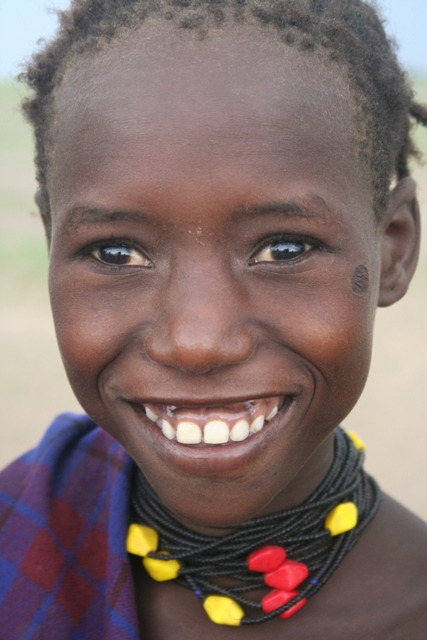
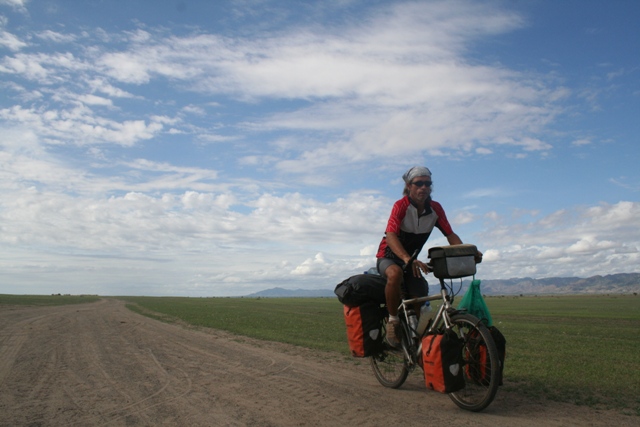 Then
in the distance the whir of an engine. A vehicle! "Stop
that truck," I shouted back to Eric. And he did, and they were
friendly folks from the medical aid charity Merlin on their way to
distribute food relief and they said sure, no problem, we've got room
for you. Although to a Westerner the Land Rover already appeared
to be full beyond capacity, Africans can always make space for one more
body. Or in this case two bodies, two bikes and twelve bags.
Then
in the distance the whir of an engine. A vehicle! "Stop
that truck," I shouted back to Eric. And he did, and they were
friendly folks from the medical aid charity Merlin on their way to
distribute food relief and they said sure, no problem, we've got room
for you. Although to a Westerner the Land Rover already appeared
to be full beyond capacity, Africans can always make space for one more
body. Or in this case two bodies, two bikes and twelve bags.
In no time we were at the next village being looked after by the kindly nuns who cooked up a delicious vegetarian meal for us and accommodated us in their spacious guest room. We'd cheated a bit, but I had no regrets, the road just wasn't cycle-able.
The next day the road improved and we made it to the border town of Todonyang where we wandered down to the lake to check out the lively fishing village. The men were busy pulling in nets and repairing boats, while the women worked at drying fish to be exported to Sudan. A recent outbreak of disease had left many cattle dead and their remains were left to rot near the collection of simple, igloo-like huts. That was our final look at the vast Jade Sea before leaving Kenya. The last ten days had been mentally and physically draining, and we were looking forward to reaching Ethiopia where there was a road. A real road that was shown on our Michelin map. Surely the cycling would be easier.
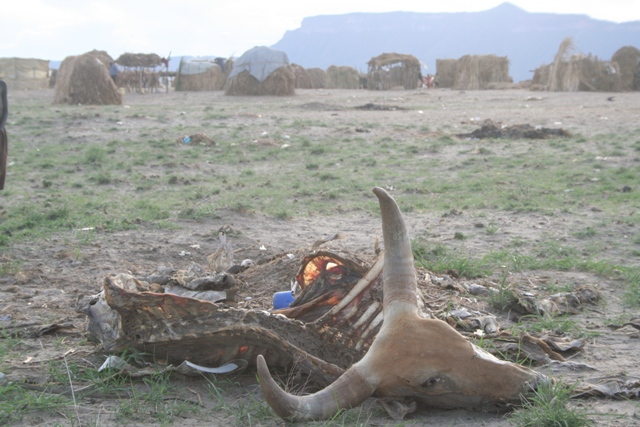
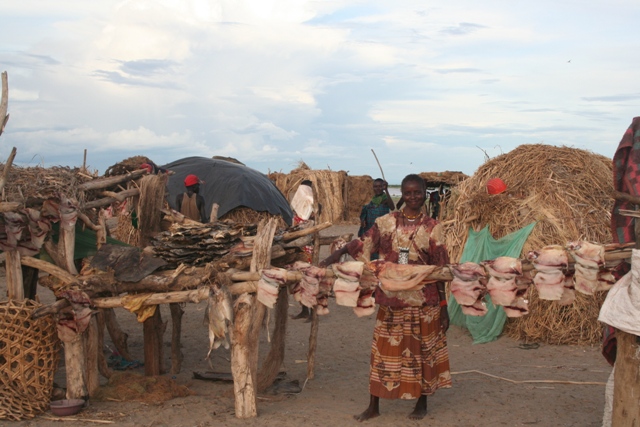
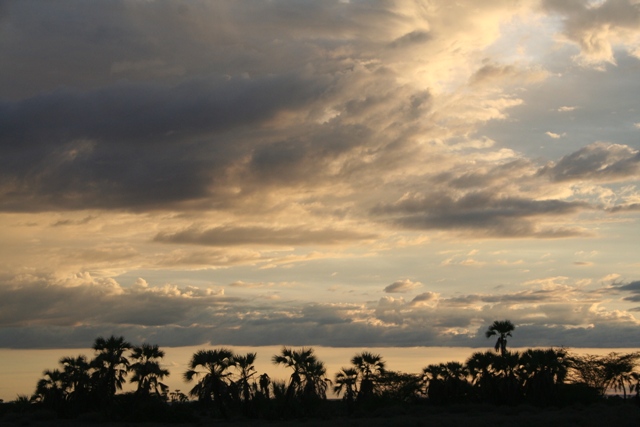

contact us at: worldbiking@gmail.com
Support our chosen charity and help educate girls in Africa-more info here

